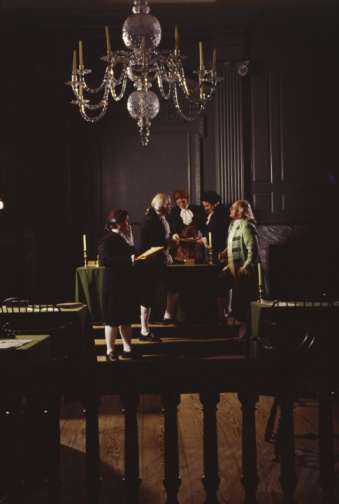The Framers Fought for a Constitution that would Stand Apart from Political Fray
Constitution Day is observed Friday, September 16, 2016. In celebration of the ratification of the U.S. Constitution, IAALS is joining with others around the country to share perspectives on the history, impact, and promise of the Constitution. This blog is part a series of Constitution Day posts, authored by members of the O'Connor Advisory Committee to our Quality Judges Initiative, which are collected here. Join the conversation in the comments below, or on Twitter with #ConstitutionDay.

The United States Constitution will be 229 years old on September 17. The Constitution was the document that charted the course for our country, mirrored in significant part in state constitutions that followed.
In one respect, the Constitution is like the rebar embedded in the concrete that supports our houses, buildings, skyscrapers, and bridges. It is unseen, but critical to the strength of the structure. So, too, our Constitution is fused into the heartbeat of our economy, our democracy, and our court system. Without it, we could not do business, pass laws, create rules of interaction with one another, or transfer power peacefully.
In another respect, it is completely different from rebar—it is more like the full faith and credit of our money system: if we do not believe in it, it goes away. For example, if we fundamentally lose faith in the institutions that govern us, they may not be able to function. If we do not trust the courts, the power of the courts may erode.
I believe that healthy skepticism is a good thing. I believe we should scrutinize our systems and our leaders. However, when it comes to the courts, I think that some critics are applying the wrong measurement—criticizing an apple for not being an orange does not get us very far.
Here is what I mean: the Framers of our Constitution balanced the power of decision making among three separate branches of government. The legislative branch includes a Senate—where the members hold longer terms and are less susceptible to the ups and downs of public opinion—and a House, where the members are up for review every two years. The executive branch includes a governor or President, whose power rests in overseeing executive agencies, enforcing the law, and signing or vetoing acts of the legislature. Each of those leaders runs for election, raises money, and solicits votes based upon expressions of an ideology that guide that person once in office.
"The courts are a different animal all together—judges are supposed to be the guardians of the constitution, not ideological, not driven by personal agendas, and not beholden to any interest group. Courts are supposed to be, above all, fair and impartial. If judges express an intent to rule a particular way on a particular issue in advance, fairness goes away. If judges cater to a particular group over another group, partiality prevails."
Hence, when critics accuse the courts of subverting the majority will, or failing to adhere to public sentiment, that is akin to criticizing them for doing their jobs. If we had judges who put their fingers in the air to test public sentiment each time they had to make a tough decision, we would not have the rule of law—we would have a rule of men and women. That kind of decision making would be untethered to the constitution and would be corrosive: that would be a rebar-less structure.
I am not suggesting that judges should never be criticized—or should not be accountable. What I am suggesting is that the template against which they should be measured is one that asks: is the judge fair; is the judge impartial or does he or she have a personal agenda that dictates decisions; does he or she apply the law to the facts of the case; does he or she have judicial demeanor and handle himself or herself ethically. Those are all questions that deserve answers, and criticism arising out of failure to meet those standards is appropriate indeed.
But, when we launch broadside attacks on the courts because we do not agree with the political implications of their holdings, we undermine the full faith and credit in the institution of the judiciary. Remember, on this Constitution Day, what the Framers fought for and drafted into our enabling document—a land where no power would ever be overly concentrated, where the courts would stand apart from the political fray, and where we could aspire to equal justice for all.


